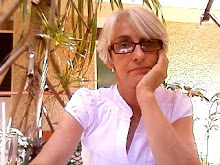This week it struck me that I am past the half-way point in the  year. As I have been organising things for the week in Ontario I am more concscious of the time. What, at the beginning o
year. As I have been organising things for the week in Ontario I am more concscious of the time. What, at the beginning o f the year seemed to be an endless year stretching ahead of me, now seems to be far too short. That being acknowledged I am also conscious that I do not want to be distracted from providing 100% here by investing too much energy in planning what's ahead. Half way through means still half way to go! The work here is strongly influencing my perspective and has served to highlight the incredible strengths of the Ontario system for children and families, as well as the remarkable organisation Kinark is. Things in Ontario may be far from perfect but there are strengths that are the envy of many. I am excited to catch up with the changes that have occurred in the last six months, and know the changes will illustrate the creativity and innovation of the organisation, as well as the tremendous commitment and capacity of the people that are part of it. Although it is still many months off I feel very lucky to be able to look forward to returning to such an exciting place to work with such a fine group of colleagues, where there is the continued opportunity to make a difference!
f the year seemed to be an endless year stretching ahead of me, now seems to be far too short. That being acknowledged I am also conscious that I do not want to be distracted from providing 100% here by investing too much energy in planning what's ahead. Half way through means still half way to go! The work here is strongly influencing my perspective and has served to highlight the incredible strengths of the Ontario system for children and families, as well as the remarkable organisation Kinark is. Things in Ontario may be far from perfect but there are strengths that are the envy of many. I am excited to catch up with the changes that have occurred in the last six months, and know the changes will illustrate the creativity and innovation of the organisation, as well as the tremendous commitment and capacity of the people that are part of it. Although it is still many months off I feel very lucky to be able to look forward to returning to such an exciting place to work with such a fine group of colleagues, where there is the continued opportunity to make a difference!
It was a short but busy week in which I pulled together the input and information from the Building Organisation Capacity Workshop, so that all in the organisation can see that there is active follow-up to their insightful and invaluable contribution. In addition, the final touches were put to another proposal, and at the end of the week the Youth Programme team got together for refresher training and a team meeting. The team meeting was a fine day spent at the Spanish Town location. It gave all the Youth Peace Facilitators time to get together, explore the subtleties of conflict resolution and anger management so critical to the work done with the youth, and time to share some of their own concerns and struggles. There are moments and events that remind me of the uniqueness of this society and one of these moments occurred in the team meeting. In sharing personal stories about resolving conflict and managing anger we were asked to rate the level of anger certain events generated and then talk about what led to those feelings. Of seven peace facilitators, two spoke of witnessing the murder of a loved one at home. I was struck by how unlikely these stories would be in most team meetings of a group of child and youth workers in Ontario, though recognise the parallel with some of the First Nations communities. Oppression has some desperate and long-standing consequences.
 reets! Carnival here is not only the parade that offers the spectacle provided by Mardi Gras or Caribana (that parade is
reets! Carnival here is not only the parade that offers the spectacle provided by Mardi Gras or Caribana (that parade is 
No comments:
Post a Comment